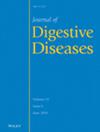Impact of rifaximin on cirrhosis complications and gastric microbiota in patients with gastroesophageal variceal bleeding: A pilot randomized controlled trial
Abstract
Objectives
The application of rifaximin, a non-absorbable antibiotic, in hepatic encephalopathy (HE) has been well established; however, its effect on other complications in cirrhotic patients with previous gastroesophageal variceal bleeding (GEVB) remains unclear. Therefore, we performed a pilot randomized controlled trial aiming to evaluate the impact of rifaximin on cirrhosis-related complications and changes in gastric microbiota.
Methods
Eighty cirrhotic patients who received prophylactic endoscopic treatment for variceal rebleeding were randomly assigned to the control or rifaximin treatment group (rifaximin 400 mg twice daily for 8 weeks). Primary outcome was the total liver-related score, consisting of changes in cirrhosis-related complications including rebleeding, ascites, HE and portal vein thrombosis (PVT). The 16S rDNA sequencing analysis was conducted with gastric lavage fluid samples for the analysis of gastric microbiota.
Results
During the 8-week follow-up, the total liver-related score decreased significantly upon rifaximin therapy (−0.35 ± 0.14 vs 0.05 ± 0.14, p = 0.0465) as well as serum C-reactive protein (CRP) (p = 0.019) and interleukin-8 (p = 0.025) compared with the control group. The rate of PVT recanalization was significantly higher in the rifaximin group (p = 0.012). Prominent difference in gastric microbiota between the two groups was observed, and the rifaximin group had a higher abundance of several taxa which were dysregulated in the progression of cirrhosis. CRP was correlated with several taxa including Alphaproteobacteria, Rhizobiales and Collinsella.
Conclusions
Rifaximin may improve cirrhosis-related complications, including PVT, in patients with previous GEVB through anti-inflammatory and microbiota-modulating functions. Trial registration number: NCT02991612.

 求助内容:
求助内容: 应助结果提醒方式:
应助结果提醒方式:


